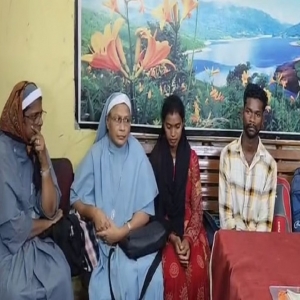
.png) Joseph Maliakan
Joseph Maliakan
.jpg)
The seven months from January to July 2025 witnessed an unprecedented 334 incidents of persecution of Christian communities across India. They included illegal arrests, physical violence, threats, disruption of prayer services and denial of basic religious freedoms guaranteed by the Constitution, including burial rights.
This sustained pattern of persecution of Christian communities reflects an alarming consistency with incidents taking place every month affecting Christian communities across the states and union territories, according to documentation made by the Evangelical Fellowship of India's Religious Liberty Commission (RLC).
The geographic concentration of violence targeting Christians is deeply disturbing, with the state of Uttar Pradesh recording 95 cases and Chhattisgarh recording 86 incidents. Together, the two states account for more than half of the documented cases. These two states, ruled by Bharatiya Janata Party (BJP) governments, have repeatedly emerged as primary hot spots where Christian families face not only violence but prolonged legal harassment under anti-conversion laws.
The misuse of these laws has become the primary weapon of intimidation, with threats, harassment, and false accusations representing two-thirds of all incidents documented for the period from January to July 2025.
Particularly disturbing are the 13 cases of denial of burial rights, with a whopping 92 per cent of cases taking place in Chhattisgarh alone, where Christian families are prevented from honouring their dead according to their faith, even on private property.
The systematic nature of this persecution is evident from the timing, with most incidents strategically executed with precision during Sunday worship services, suggesting organised monitoring and disruption of Christian religious gatherings. The brutality of some of the incidents underscores the escalating nature of persecution of Christians.
In July, six pastors in Bhilai, Chhattisgarh, were wrongfully detained and severely beaten with wooden batons inside Durg jail simply for identifying as pastors. Despite documented evidence of torture under custody, charges against the pastors are vigorously pursued, and no action has been taken against the attackers or jail officials responsible for the abuse.
The 334 documented cases actually represent only a fraction of the actual incidents, as many go unreported due to fear of reprisals and intimidation by the police and local authorities.
The pattern of persecution reveals a coordinated effort by fundamentalist organisations and the local administration to suppress Christian religious ex
Given the sensitive nature of religious freedom violations and fear of reprisals, many victims are reluctant to report incidents formally. In remote areas, reports of persecution often go unreported because of a lack of communication infrastructure.
The incidents spanned several states, with the highest incidents taking place in Uttar Pradesh, Chhattisgarh, Madhya Pradesh, Bihar, Karnataka, Haryana, Rajasthan, Jharkhand and Odisha. Uttar Pradesh and Chhattisgarh emerged as primary hot spots for persecution of Christians, continuing a troubling pattern with frequent reports of arrests, false accusations, physical violence and social boycotts.
They are followed by Madhya Pradesh (22), Bihar (17), Rajasthan (15) and Haryana (15), demonstrating that persecution spans multiple states across different regions of India. While incidents occurred consistently throughout the seven months, March recorded the highest number (66), followed by June (52), compared to a monthly average of 48 incidents, indicating periods of heightened tensions affecting Christian communities.
Many incidents occurred on Sundays during or after worship services. The documented incidents fall into several distinct categories. They included threat, harassment, falsely accused and arrested, physical violence, church worship disrupted or stopped, social boycott, vandalism, church burnt, hate campaigns, forced conversion and even murder!
On 25 July 2025, two catholic nuns from Kerala, sister Preeti Mary and sister Vandana Francis, were arrested at Durg railway station while accompanying three young tribal women for training in an Agra hospital. Despite proper documentation, the two sisters were charged under trafficking and anti-conversion laws following complaints by members of the Bajrang Dal.
Video footage of the incident showed the nuns being threatened by Jyoti Sharma of Durga Vahini Matrushakti inside the police station while police officials stood by. The incident sparked national political outrage, illustrating that coordination between different actors can criminalise basic social service activities. The fact that the two nuns were hospital workers, one a nurse and the other a pharmacist, did not matter to the Hindutva activists, the police or the judiciary.
Anti-conversion laws, strangely named Freedom of Religion Acts, designed to prevent forceful conversions, are being systematically exploited to criminalise legitimate religious activities and social services. The vague language used in the hastily made anti-conversion laws, many of which are blatantly unconstitutional, enables arbitrary application, with Christians facing the prospect of imprisonment up to 10 years for constitutionally protected religious activities.
The legal framework intended to protect religious freedom actually results in restricting it. The various state anti-coversion laws are under challenge in the Supreme Court. But for some inexplicable reason, the Supreme Court has not shown any urgency to consider the matter, and the persecution of the Christian community under these laws continues unabated.
In this context, the RLC pointed out that the promise of religious freedom for all citizens requires immediate, concrete action by government authorities, law enforcement agencies and the judiciary. Law enforcement agencies must fulfil their constitutional duty to protect all citizens regardless of faith.
The systematic misuse of anti-conversion laws requires immediate review to ensure alignment with constitutional principles. The Supreme Court must urgently address the issue so that India's secular fabric is not irreparably torn apart.